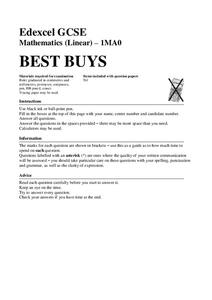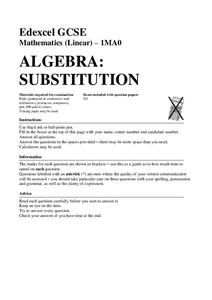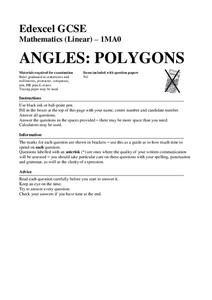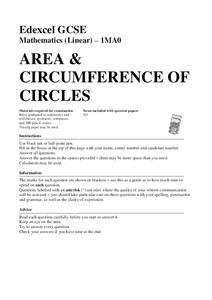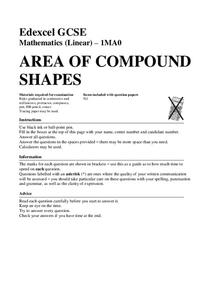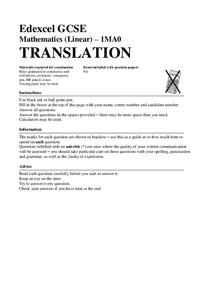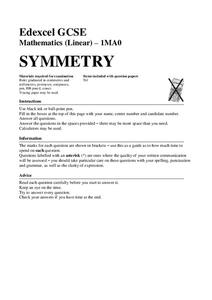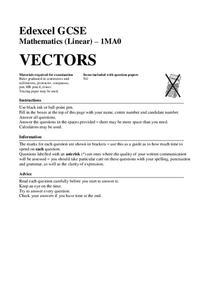Mathed Up!
Best Buys
Which scenario is the better deal? Class members examine nine scenarios to determine which choice offers a better deal. Pupils decide whether they need to find unit costs or total prices to compare the two options.
Mathed Up!
Algebra: Substitution
The sixteen problems in this resource present opportunities for pupils to practice substituting into algebraic expressions. Scholars evaluate algebraic expressions for given values of the variables. In a few cases, class members need to...
Mathed Up!
Angles: Parallel Lines
Viewers are presented with seven problems with parallel lines and angle relationships and must use the given information to find the measures of specific angles. To finish, they explain their process in finding the measures in the...
Mathed Up!
Angles in Triangles and Quadrilaterals
This short video show viewers how to connect the sum of the angles in a triangle to other angle measurements. Pupils determine the missing measures for angles involved with triangles and quadrilaterals. Class members then must explain...
Mathed Up!
Angles in Polygons
Show your class that finding angle measures is a regular calculation with a resource that provides 12 problems dealing with the measures of angles in regular polygons. Pupils use formulas for the sum of measures of angles in a polygon to...
Mathed Up!
Area and Circumference of Circles
Don't go around and around, help your class determine amounts around and in a circle with a video that connects circumference to the perimeter or the distance around an object. The resource includes 14 questions dealing with circles and...
Mathed Up!
Area of Compound Shapes
Scholars learn how to determine the area of compound shapes by finding the areas of the basic shapes that make it up. Pupils find the areas by adding areas together or subtracting them.
Mathed Up!
Rotation
Two videos show first how to perform a rotation, given the center, the angle, and the direction of rotations. Individuals then see how to find what the rotation is from one figure to another. Pupils practice doing both in seven problems...
Mathed Up!
Reflections
Tracing paper is not just for art anymore — pupils can use it to find reflected images, too! Two videos show how to reflect images using tracing paper and find the reflection between the pre-image and image. Learners perform reflections...
Mathed Up!
Enlargements
Make enlargements with and without centers. Pupils work through seven problems dealing with dilations or enlargements. The first couple items are strict enlargements without centers, while the others have centers. Class members also...
Mathed Up!
Translations
Introduce translations as transformations that move figures in horizontal and vertical distances with a video that shows how to translate the figures. A second video covers how to determine the translation that has occurred. Pupils...
Mathed Up!
Mixed Transformations
Viewers learn how to identify and perform a variety of transformations with a video that provides seven items on transformations. Pupils demonstrate their understanding of dilations, reflections, rotations, and translations. The video...
Mathed Up!
Nets, Plans, and Elevations
A dimensional resource teaches viewers to recognize 2-D views of 3-D objects and how to match nets with their 3-D figures. Individuals draw different views of three-dimensional objects including views from the front, side...
Mathed Up!
Symmetry
Eleven problems provide pupils the opportunity to find the lines of symmetry or identify rotational symmetry. Scholars alter designs to make them symmetrical, learn to recognize signs that are symmetrical, and identify the type of...
Mathed Up!
Pie Charts
Representing data is as easy as pie. Class members construct pie charts given a frequency table. Individuals then determine the size of the angles needed for each sector and interpret the size of sectors within the context of frequency....
Mathed Up!
Stem and Leaf Diagrams
Order the data within a stem-and-leaf display. Pupils take data and create and ordered stem-and-leaf diagrams, including the key. Participants take their data and determine answers about the information. Class members then find...
Mathed Up!
Area of Sector and Length of Arcs
Viewers learn how to apply proportional reasoning to find area of sectors and arc lengths with a video that starts off explaining how to find the areas of circle sectors and the lengths of arcs. Scholars then practice solving problems...
Mathed Up!
Vectors
Young mathematicians connect vectors to geometric shapes by watching a video that expresses vectors in relation to the sides of geometric figures. They then apply what they learned by completing a activity of practice questions.
Mathed Up!
Proof
Scholars learn how to write number theory proofs by viewing a video reviewing techniques for proofs on divisibility, parity, and consecutive integers. They then write proofs for a handful of conjectures on a instructional activity.
Curated OER
Using Parentheses With Computation
In this computations worksheet, 4th graders solve 7 written expressions utilizing the mathematical strategy of solving what is in parentheses first and then completing the rest of the expression.
Curated OER
Expressions of Quantity
In this expressions of quantity worksheet, students choose an expression of quantity to describe a group of numbers or symbols. Students use the phrases "all of", "almost all of", "most of", "some of", or "non of" to describe the sets.
Curated OER
Mr. Payne Word Search Puzzle
In this language arts worksheet, students study 10 words in a word bank, then locate them in a word search puzzle. The words appear to be related to algebra; the meaning of the title is not known. There is one misspelled word in the word...
Curated OER
Penny, Pennies
In this coin counting worksheet, students will see the front and back sides of a penny and learn how to write cents with numbers and symbols, as well as in words. Then students will count groups of pennies from 1 to 5.
Curated OER
Order of Operations C
In this math worksheet, students solve the problems using the Order of
Operations to find the solutions. The answers are found on page two.


